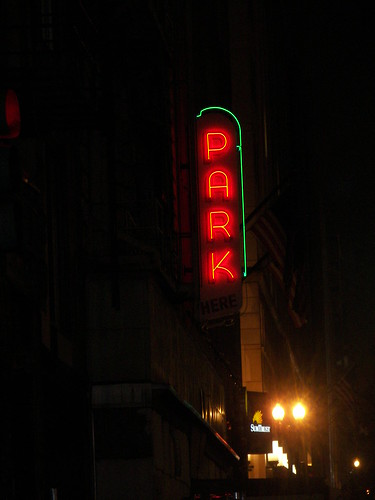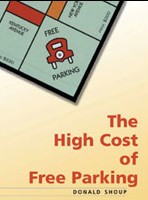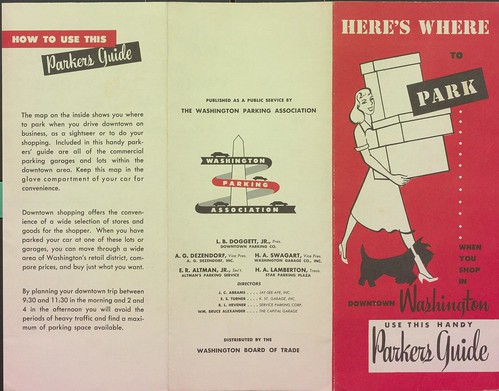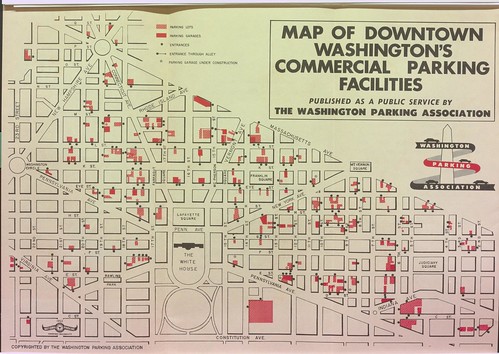1953 brochure, Downtown Washington DC Parker's Guide
 Neon parking sign on 11th Street NW, Washington, DC.
Neon parking sign on 11th Street NW, Washington, DC.Given the spirited discussion in the GGW entry, "Less parking needed for housing atop Metro, not more," about how much parking should be provided in newly constructed multiunit buildings, in response to an action by ANC6E calling on a building to provide more parking than zoning requires, it's worth presenting this brochure, which I recently acquired.
The big problem with parking and curb space management "policy" in DC is that it is focused on maintaining the privileges of current residents, without applying any of the most basic economic principles toward allocating the resource, in a situation where the supply of street parking is fixed.
One problem with underpricing street parking--a residential parking permit costs $35 per year--is that it severely undercuts the ability of off-street parking to be able to be provided profitably, because the market is severely distorted. Therefore developers have no incentive to provide or market off street parking. This further exacerbates the problem.
The brochure is actually focused on providing parking in commercial areas of the city, specifically downtown, and was published by the "Washington Parking Association." Commercial parking isn't the subject of the GGW entry, but it faces the same issues.
By not planning for "parking" by simultaneously addressing the public resource, on street publicly controlled parking, as well as off-street privately controlled parking, it misses a significant portion of the market and supply. But similarly, as long as street parking is significantly cheaper than off-street parking, it makes no sense for most of the office buildings to market parking to non-tenants, and parking is mostly managed as an amenity for office tenants.
 Note that cities that have municipal parking structures in addition to controlling on-street parking have many more options at their disposal for managing supply and demand. Hoboken, NJ is one example ("Car sharing gamble in Hoboken has mixed reactions," New York Times) and Pasadena, famously ("Turning Small Change Into Big Changes," Access Magazine, UC Transportation Institute; "The High Cost of Free Parking," Journal of Planning Education and Research; The High Cost of Free Parking, book) is another.
Note that cities that have municipal parking structures in addition to controlling on-street parking have many more options at their disposal for managing supply and demand. Hoboken, NJ is one example ("Car sharing gamble in Hoboken has mixed reactions," New York Times) and Pasadena, famously ("Turning Small Change Into Big Changes," Access Magazine, UC Transportation Institute; "The High Cost of Free Parking," Journal of Planning Education and Research; The High Cost of Free Parking, book) is another. Back to the brochure. The brochure helpfully lists the officers of the association. The president was Lloyd "Bud" Doggett, who was notorious for successfully lobbying Congress to prevent DC as a municipality from building and managing parking structures. See the past blog entry, "My kind of civic leader."
This blog entry, "Transit makes no sense in the Washington region... and it's better to serve 16,500 people/week vs. 70,000 people/day," quotes from a Parking Magazine editorial from 1962 which stated that providing subway service to Downtown Washington to serve commuters made no sense. Obviously, the parking industry is pretty much self-interested, and not focused much on overall urban design, transportation throughput, and placemaking.


Labels: parking and curbside management, transportation planning, urban design/placemaking



17 Comments:
sorry -- that was me.
spirited? Useless.
Much like the height limit and rent prices, the parking minimum debate is being hijacked by the "car free" movement.
There is plenty of room in DC for everyone to own a car. What we can't do, however, is all drive them to work downtown. That is what we have to work against. Again, car light, not car free.
So yes, your map is very relevant. DC is lucky that high land prices means little to no surface lots anymore, and that a good chunk of the workforce doesn't pay for transit.
And you also make a good point that underpricing street parking in the rowhouse city means you are killing private parking. Both in terms of conversions (which are permanent) and the ability of private operators to offer parking garages for monthly rent. I'd kill for an underground garage around U st for $100 a month -- safe, no weather damage.
Related to that would more expensive parking on the street downtown get more garaged to stay open past 7. I'd say we have had that experiment since late night hours and the answer is no. Doubly so when you consider the valet situation.
the big problem in DC is the HPRB with it's blue hair idiots who focus on lopping off stories and discouraging density and pushing larger and larger parking facilties- these people should be elected if they are to have so much authority and power.
What is wrong with living car-free? You may think we are eccentric. And perhaps we are. But we are having the last laugh, all the way to the bank. As opposed to the doctor's office, which is where car dependence leads far too many Americans far too early in life. Or the morgue, which is where car accidents put 40,000+ Americans each year, not to mention the millions accidents put in the hospital.
Anyway, I'd rather be regarded as eccentric than be one of those people who at age 40 find themselves overweight with high cholesterol and unable to walk more than a few blocks without getting tired. (I am always amazed at what car owners consider a long walk. I may be strange for not owning a car. But they are lazy.)
Not that I can speak for charlie, but I think his points are reasonable. That we should accommodate automobility to the extent that we can--recognizing that the city was designed pre-automobility and wasn't designed to accommodate hundreds of thousands of cars--without making over the city in ways that are negative, that reduce quality of life.
Another way to think about car lite is car use vs. car ownership.
I use car sharing, I use rental cars. But not that much (I call it "car heroin" and work hard to not be seduced). Most of the city's parking policies privilege resident car owners. And so they end up screwing someone like me who uses cars occasionally.
But I am a resident too. What justifies the differential treatment?
I think the intersection point between rg and charlie is on this general point.
You don't have to own a car to get around, but you can supplement your sustainable mobility lifestyle (e.g., I am not so ascetic that I would do what some people do in Portland and move houses via bikes, not motorized vehicles, it just doesn't make sense to me, although I have moved many objects a great distance on city streets with dollies and hand trucks).
The reason I have come around more on providing structured parking in activity centers like H St. and Capitol Hill is because it is a quality of life issue for residents in terms of reducing traffic on the streets looking for parking, competing with them for spots etc.
The other reason is that it would allow us to use scarce on street space for uses other than car storage.
charlie, but the other key point is not only can we not all drive to Downtown (or to Georgetown, Dupont Circle, Columbia Heights, H Street, Friendship Heights, U Street, or Capitol Hill), we can't park cars for every household on the street either, especially if households have multiple cars, especially if we charge almost nothing for the privilege of parking on the street.
(Not that you don't know this.)
I have noticed that business improvement districts in other cities sometimes do coordinated valet parking. There are multiple valet drop off locations, but I think it's one integrated system.
(One is North Park in San Diego.)
DC districts could do that, coordinated with specific, participating garages. So all garages wouldn't have to be open at night, but you could start out and test the program.
One of my idle projects is to create a parking toolbox document, that would go far beyond the efforts that Angelo Rao was involved with here in DC. I guess he isn't the parking planner anymore, but I don't know...
Adding the coordinated valet program would be another on the list.
http://urbanplacesandspaces.blogspot.com/2012/12/testimony-on-parking-policy-in-dc.html
After the first public meeting on the parking stuff, I sent all these ideas to Angelo in a set of emails and never got a response.
not tinkering with the height limit kills the ability to pay for the separated blue line and Metro expansion within DC. To me, then, it becomes an acceptable tradeoff to increase the height, and I consider myself a hardcore preservationist.
and were I to get a job in the Baltimore region again, I'd probably get a car this time, if it's a permanent job... That 2.5 hour each way commute, albeit by sustainable means, could have been cut in half with a car... then again, too bad I am semi-unemployable around here.
I agree that the city needs to accommodate automobility. It's not going anywhere anytime soon. At the same time, it needs to do everything it can to encourage car-free and car-lite households. It makes little sense to denigrate those who are car-free. Indeed, households like mine are the car-dependent's best friend. More parking for them! (And cleaner air, less noise, etc. And more money that stays in the local economy.)
I also agree that there is a big difference between car ownership and car-free. I do not own a car, but I use them sometimes, mostly when I travel for work to cities with poor transit service and/or walkability and on occasion in DC. (Though my nifty bicycle trailer has really reduced my use of car sharing. It is amazing what you can haul on a bicycle trailer!)
Anyway, I guess I get snippy when car people criticize the car-free, especially given their own super-inflated sense of entitlement and their incredibly privileged position in public policy debates and public expenditures.
@Richard; well, my point is there is plenty of room for every car in DC (250K? 600K) to park on the street. There is a lot of streets! But you are not going to find parking a few blocks from you.
And in terms of valet, I was referring to the tendency of valet parking to use street parking, rather than a garage. Bizzare but true.
And yes, there is a lot of play on the valet front.
In terms of "car heroin", yeah. Car2Go is very bad. I haven't bough gas since early may, but have been blowing close to 120 a month on car2go -- ok that is for two people.
But again the way for transit to win is to make it better. I had a choice last weekend to circulate or car2go from woodly to U st. Choose the circulator becuase it was actually faster.
And bike -- I can bike -- hell I can almost walk -- faster from U st to the West End than metro. Driving is about the same but then you have to deal with parking...
@RG; yes, living car-free theoretically gives me more street parking and less congestion. Not sure how you measure that? But I try to find more carrots than sticks in getting people to not drive. Of course there are days, like today, when I was caught out in the rain and would have killed for a car...
one year during the ann arbor art fair we parked cars on our house lot, on a triple lot one house over that we could control that at the time was undeveloped, on some railroad ROW, and yes, on any street space that opened up.
so yes, I understand valet parkers who use the streets...
2. charlie, it goes without saying that you're not interested in parking out at Fort Lincoln. But as usual, you make a very good and sly point.
like the Yogi Berra quote "nobody goes there anymore. It's too crowded." Of course, everybody wants and "needs" to park in the L'Enfant City/L'Enfant City extended--the denser parts of the city.
... e.g., there is parking capacity available around where I live, which is 0.8 miles to the Takoma Metro, 5 miles from Downtown, 2+ miles to Petworth, etc.
Absolutely, which is why we need parking minimums where there is demand (largely L'enfant city) and relax them where we need to encourge investment....
There is zero case for parking minimum requirements at all.
If there's a great demand for parking, then the market will make it happen. All that the minimums do is distort the market.
And this is not an anti-car perspective, merely one that accounts for the costs and benefits of parking.
The problem with the very assumption of charlie's (we have high-demand areas, therefore we must mandate supply) is that it does not account for price. If you want to manage demand, you do so via price; not a supply quota.
I didn't take the same inference from charlie's comment. But I may have been just interpreting from my perspective, that we need to charge more for on street parking.
As long as we don't, we have the market distortions.
As far as charging goes, we can't have two very different submarkets, one where parking is virtually free (street parking) and the other where it costs money, for residential parking, and similarly in the office districts, where street parking meters charge significantly less per hour than the off street. (The off street rate is by tiers, and the on street by hours, so it's hard to give a percentage exactly of the difference in price, it's easily 1/3 of the cost of off street parking. That's why Pasadena, where they control both on and off street parking, they can make it work better.)
Thanks for the guide. this information help me my store online medicine website How to seo.
Post a Comment
<< Home